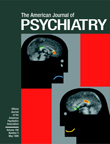To the Editor: My colleagues and I applaud Arjan Braam, M.D., and his colleagues for their excellent work examining the effects of religion on depression outcome in older adults in the Netherlands. These investigators conducted a 12-month prospective study of 177 persons aged 55–89 years who were selected from a large community-based population if they scored 16 or higher on the Center for Epidemiologic Studies Depression Scale. Religious salience was measured by a single variable. Subjects were asked to choose the three domains of life they considered most important in their present situations. Among the eight domains presented to subjects was “a strong faith”; if the subjects chose “strong faith,” religion was considered salient to their lives (29% of subjects). Absence of religious salience was associated with persistence of depression (odds ratio=5.91, 95% confidence interval=1.48–23.6). This effect was stronger in women; in fact, 100% of women with low religious salience (N=24) had persistent depression compared with 50% of women with high religious salience (p<0.01). Among subjects with one or more chronic illnesses, those with pain, and those with one or more functional limitations, the effects were particularly strong.
As Dr. Braam and colleagues note, their discovery of a strong effect of religious salience on depression in older adults with chronic illness and disability is the same pattern of results we have now found in two separate studies of medically ill older adults in the southern United States. Investigators in other areas of this country have likewise discovered that religiousness appears to buffer the effects of stress, whether related to health problems
(1,
2) or other significant losses
(2–
4). Idler, reporting data from the Yale Health and Aging Study, found that at any given level of chronic medical illness, elderly men who were more religious perceived themselves as less disabled than did less religious men with the same level of chronic illness
(1). Thus, religiousness may provide a more positive outlook on health and ability to function, particularly among elderly people with chronic, often untreatable, medical disability.
Dr. Braam and colleagues’ report from the Netherlands, where religious beliefs and practices are less common than in the Bible Belt South and many other areas of the United States, is especially important because it suggests that these findings may apply more widely, particularly to populations where religion is less of a cultural force in society.

